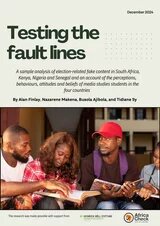Testing the fault lines
Election-related disinformation is reshaping democracies across Africa. Testing the Fault Lines examines how fake content spread during elections in South Africa, Kenya, Nigeria, and Senegal fuels distrust, exploits divisions, and skews public perception.
This study explores how media studies students engage with false information, revealing that while media literacy helps, vulnerability is shaped by national context and gender. From deepfake videos to impersonated media outlets, disinformation is crafted to appear credible and spread rapidly.
Can digital literacy counter its impact? Testing the Fault Lines exposes the tactics behind election misinformation and its risks to democracy.
Product details
Table of contents
Executive Summary
- Introduction
- Objective of study
- Research group
- Research methods
4.1 Sample content analysis
4.2 Focus group sessions
4.2.1. Student participants
4.2.2. Questionnaire
4.2.3. Focus group discussions
4.3 Interviews - Country profiles
5.1. South Africa
5.2. Kenya
5.3. Nigeria
5.4. Senegal - Analysis of election-related fake content
6.1. South Africa: the 2024 national and provincial elections
6.1.1. Content categories
6.1.2. Content types
6.2. Kenya: The 2022 general elections
6.2.1. Content categories
6.2.2. Content types
6.3. Nigeria: The 2023 general elections
6.3.1. Content categories
6.3.2. Content types
6.4. Senegal: The 2024 presidential elections
6.4.1. Content categories
6.4.2. Content types - Findings of focus group sessions
7.1. Political, information and trust environments
7.1.1. Perception of political environment
7.1.2. Enagement in political environment
7.1.3. Reliability of information environment
7.1.4. Trust environment
7.2. Social media use and sharing behaviours
7.2.1. Carefulness of sharing information
7.2.2. Correcting others online
7.3. Attitudes to forwarding election-related fake content
7.4. Credulity: An account of the tendency of students to believe fake content
7.4.1. Responses by gender
7.4.2. Responses by country and year of study
7.4.3. Testing belief in common disinformation narratives - Discussion of findings
- Conclusion
- Appendix
